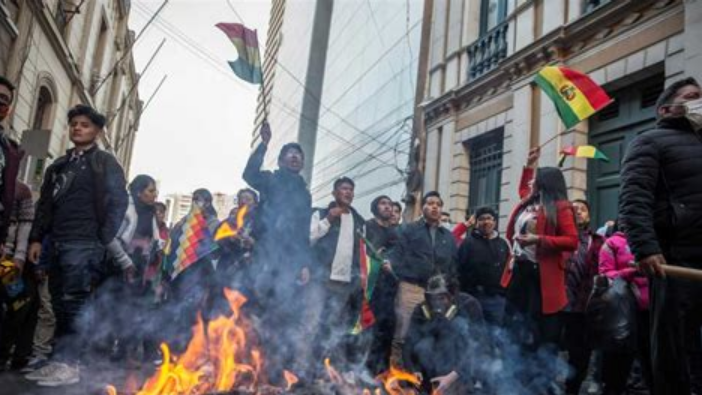
On the afternoon of Wednesday June 26 it was officially declared that the attempted military coup had been defeated.
On the afternoon of June 26, hundreds of military personnel had mobilized under the order of General Juan Zúñiga in the center of La Paz and surrounded the Quemado Palace (the government palace) ahead of a ministerial meeting. They proceeded to break down the main door to the palace with a tank and attempted to enter by force.
Zúñiga then announced that the military personnel would mobilize to the prison and free Bolivia’s “political prisoners” including Jeanine Áñez and Luis Fernando Camacho who are imprisoned over their involvement in the 2019 coup against the socialist government of Evo Morales.
The Bolivian left immediately alerted to the development publicly called on the Bolivian people to mobilize in opposition to the far right coup attempt.
While the army attempted to storm the palace, hundreds of Bolivian people began to mobilize to demand that the army stand down. These protests with members of mass organizations, trade unions, and the general population were met with heavy repression by the military police officers who shot tear gas indiscriminately and blocked off access to the Plaza Murillo.
The Bolivian Workers’ Central (COB) representing over 2 million workers, declared an indefinite general strike and “the mobilization of all social and union organizations to the city La Paz to defend and restore the constitutional order and our legally established government in Bolivia.”
After an hour of the military encirclement of the Palace, Bolivian President Luis Arce held a press conference to name José Sánchez as the new military command to replace Zúñiga. Sánchez ordered the military personnel that had mobilized to the center to return to their stations to avoid any bloodshed of the Bolivian people and affirmed that he supported the legal and constitutional government of Luis Arce.
Shortly after the pronouncement by Arce and Sánchez, the tanks that had initially blocked off the plaza and surrounded the palace began to withdraw, and thousands of people flooded the area to affirm their rejection of the attempted coup.
The attempted coup in Bolivia had international repercussions. Political leaders across Latin America and the Caribbean vehemently rejected the attempt by a fraction of the Army to impose a far right coup on the society and celebrated the swift defeat of the attempt. Many highlighted that this took place just five years after the coup d’état which took Evo Morales out of office and installed the de facto leader Jeanine Áñez.
COB and other organizations in Bolivia have celebrated the people’s victory but also called on the Bolivian people and the international community to continue their vigil and state of alert against any further coup attempts.